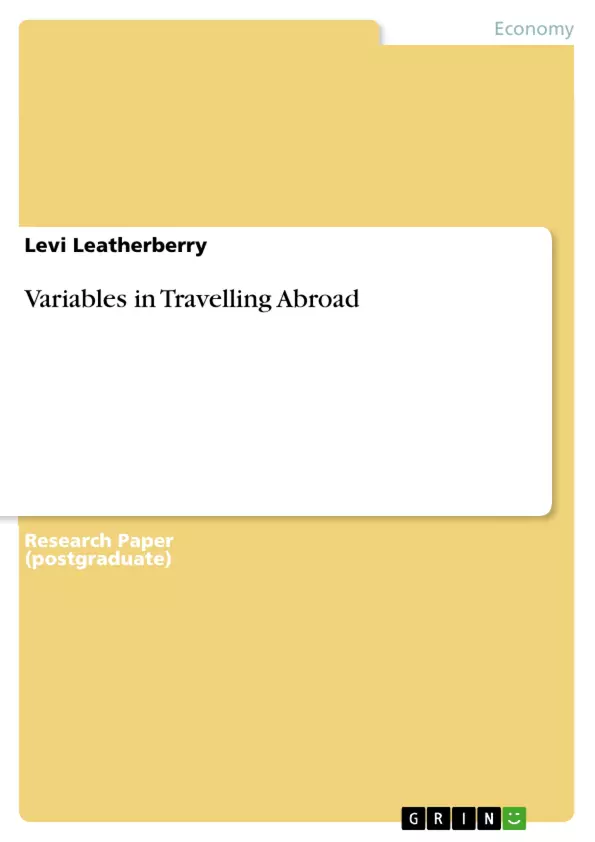Traveling has effected nations and individuals since nearly their conception. Centuries have become witness to the trends of travel and from the whims of the individual to the necessity of a refugee. As the world becomes more integrated travel has increases, and suddenly there are more foreigners eating around you, living around you, and speaking their language in front of you. Begging many citizens to researchers to ask the question what makes people travel? To many these are immigrants seeking a better life, driven by poverty and desperation from their homeland to those of greater wealth and opportunity. Yet this does not explain Americans emigrating to Western Europe, or emigration vice versa. Although income is a significant motivation for traveling there are many other factors at play, how many travel agencies are there advertising travel based on income saying “go to Pairs – there’s a surplus of low-wage jobs”. Surely there are other factors influencing the reasons for travel, things like family, friends and experience overseas are likely to decrease the negative assumptions of many travelers as they become acquainted or attached to the prospect of traveling to other nations. While fear and negative media coverage are likely to increase negatively impact the likeliness of travel, it is sensibly hard to imagine someone traveling to a nation they are terrified of. Thus the degree of fear and its effect on travel will be the focus of this study. The impact of terrorism on international travel and the effect of negative media coverage are good ways to measure the impacts of fear on potential travelers as well as the resilient trends of some decision making parties. To this effect the impact of terrorism after 9/11 had on the general public, and the Summer Olympics in Athens in 2004 are good measures of these trends. Because people generally know how they feel about terrorism, especially when it’s directed at themselves. These cases examine the premise of traveling - safety, the safer people feel the more they travel.
Inhaltsverzeichnis (Table of Contents)
- I. Introduction / Research Question
- II. Literature Review
- Fear and reactions to fear
- Resilience
- Capability
- III. Concepts and Hypotheses
Zielsetzung und Themenschwerpunkte (Objectives and Key Themes)
This research paper investigates the factors influencing individuals' decisions to travel abroad. The study specifically aims to explore the impact of fear, particularly the role of terrorism and negative media coverage, on international travel.
- The influence of fear on travel decisions
- The role of media in shaping perceptions of travel safety
- Resilience and counteractive forces against fear
- The impact of technology and gender on travel accessibility
- The influence of transportation systems on international travel
Zusammenfassung der Kapitel (Chapter Summaries)
- I. Introduction / Research Question: This chapter introduces the research question and sets the stage for the investigation. It explores the multifaceted reasons why individuals choose to travel abroad, highlighting the importance of understanding the role of fear in this decision-making process.
- II. Literature Review: This chapter delves into existing research on the relationship between fear, resilience, and travel. It analyzes studies examining the impact of terrorism on tourism, the influence of media on public perception, and the resilience of individuals in the face of security threats. It also explores the limitations imposed by technology, gender, and transportation systems on travel accessibility.
Schlüsselwörter (Keywords)
This research paper focuses on the following key terms and concepts: international travel, fear, terrorism, media, resilience, technology, gender, transportation systems, travel decisions, and accessibility.
Frequently Asked Questions
What are the main factors influencing the decision to travel abroad?
While income and opportunity are major factors, others include family, friends, personal experience, and psychological factors like fear and resilience.
How does fear affect international travel?
Fear, often heightened by negative media coverage and terrorism, negatively impacts the likelihood of travel. People generally travel more when they feel safe.
What role does the media play in travel decisions?
Media coverage of events like terrorism can shape public perception of safety, which directly influences whether individuals decide to visit certain nations.
What are some examples of events used to measure the impact of fear on travel?
The study examines the impact of the 9/11 attacks and the 2004 Summer Olympics in Athens to understand trends in travel safety perception.
Do technology and gender influence travel accessibility?
Yes, the research explores how factors like technology, gender, and transportation systems can impose limitations on or facilitate travel accessibility.
- Quote paper
- Levi Leatherberry (Author), 2010, Variables in Travelling Abroad, Munich, GRIN Verlag, https://www.grin.com/document/167038



